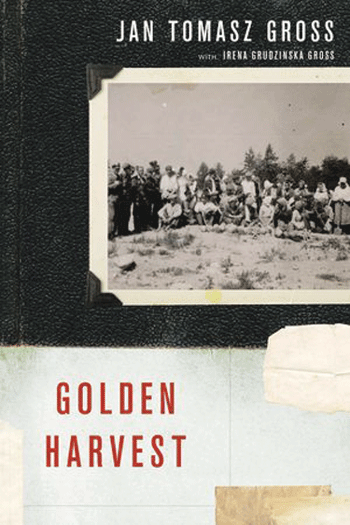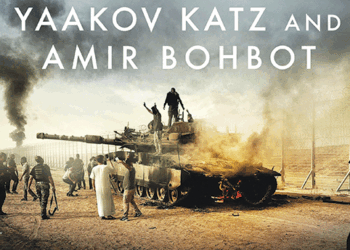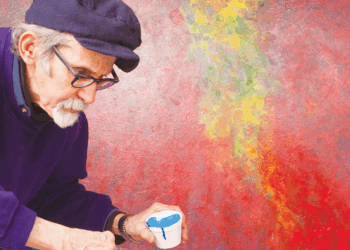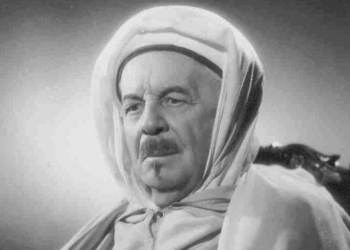Reviewed by NEAL GENDLER
Poles living near death camps such as Treblinka found both pleasure and profit in the killing of Jews, a people living in Poland 800 years.
A postwar photo in which peasants and militia appear to be posing in a sandy field was the catalyst for Golden Harvest, Jan Tomasz Gross’ compact, unemotional and extraordinarily powerful account of how Poles — particularly — despised, robbed and killed their neighbors, then robbed their incinerated remains.
Gross calls the photo “reminiscent of harvest iconography — not quite a celebration, but a restful pause,” like one “taken of peasants after a harvest. In this case, the harvest was Jewish gold and valuables,” and the subjects were standing amid a field of human ash at the Treblinka death camp. Similar “harvests” occurred at other extermination camp sites, Gross says.
While grave robbery isn’t new, the source of the ash makes this form particularly grotesque. The harvesters seem oblivious to the horror of what they are doing: “digging up and examining rotting human remains and ashes” in search of jewels and gold fillings overlooked by the victims’ tormentors and killers.

“The photograph conveys a deeper truth,” Gross says: The populace “appreciated the Nazi policy of cleansing the area of Jews and figured out that it could enrich itself in the process.” As recounted by Poles and Jews hiding as Aryans, Gross says, “some variation of the line, ‘We’ll have to put up a monument to Hitler for having gotten rid of the Jews’ was overheard in private conversations all over Poland.”
Writing of the Kielce countryside, Gross said the killing of Jews was “socially sanctioned in multiple ways. Regular members of the community took part,” including what passed for the local elite. “Killings were carried out openly, often publicly, drawing crowds of onlookers.”
Gross, a Princeton history professor, is also the author of the controversial Neighbors: The Destruction of the Jewish Community in Jedwabne, Poland, where the town’s Poles rounded up Jewish neighbors, locked them in a barn and set it afire. Golden Harvest names similar occurrences; in one, locals were looting Jewish homes even before the fire was lit. (Gross’ contributor, Irena GrudziÅ„ska Gross, is associate research scholar in Slavic languages at Princeton.)
“Greed played a fundamental role as a motivation in the behavior toward Jews during the [German] occupation,” Gross says. “Plunder as well as murder were a collective enterprise. Local people took part in it openly and in open cooperation.” The photo suggests lack of shame; Gross likens it to “trophy pictures.”
Indeed, the town of Treblinka prospered from the death camp and the spending of its guards. The locals dressed better, too, wearing victims’ clothes, called — like other looted goods — “post Jewish.”
Poles were not Europe’s only Jew haters, freelance killers and profiteers, but Polish-born Gross focuses on them. One must acknowledge that the 6,339 Poles honored at Yad Vashem in Jerusalem for risking their lives to save Jews are its largest national group, ahead of the Netherlands’ 5,204, France’s 3,513 and Ukraine’s 2,402. (Danish rescuers insisted in being listed as 22 groups.)
Of course, Poles had the numerically greatest opportunity: Poland was home to half the six million slaughtered. Gross mentions a “disturbing feature that surfaces again and again in the way Jews collectively remember this period: a recurring observation that the ‘locals’ (be they Ukrainians, Lithuanians or Poles) were ‘worse than the Germans.’” The Germans killed strangers; the locals killed their neighbors.
Gross quotes an educated Polish landowner whose memoirs say that he felt compassion, but “I considered the Jews to be an internal enemy, so I could not help feeling glad that we were getting rid of this enemy… I could not hide satisfaction when I rode through our little towns and saw that there were no more Jews.”
Poles, he wrote, considered “being liberated from the Jews” a blessing, and he was sure he “was expressing the opinion of the overwhelming majority of my fellow nationals.”
***
Neal Gendler is a Minneapolis writer and editor.
(American Jewish World, 5.25.12)


















